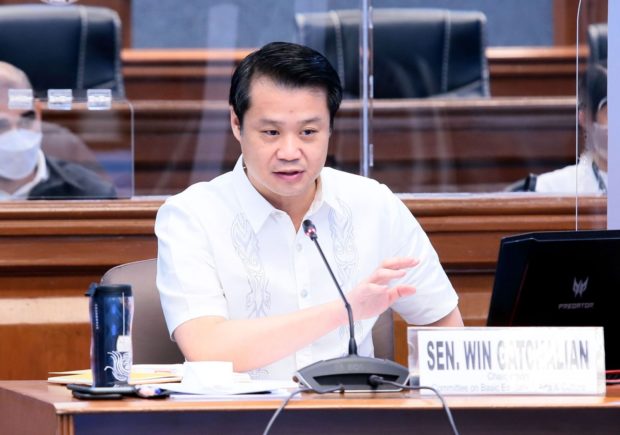
Sen. Sherwin Gatchalian, chair of the Committee on Basic Education, Arts and Culture. Senate PRIB file photo / Albert Calvelo
MANILA, Philippines — Senator Sherwin Gatchalian on Saturday warned of a “likely spike of learners with poor performance” following the recall of the pilot implementation of face-to-face classes in the country.
Gatchalian said that President Rodrigo Duterte’s decision to cancel the dry run of physical classes is a precautionary measure against a new COVID-19 variant that is now spreading across the world.
“The Chairman of the Senate Committee on Basic Education, Arts and Culture warned, however, that the country should brace itself for the aggravation of the current learning crisis and a likely spike of learners with poor performance,” his statement read.
Gatchalian said the government should mitigate the looming learning losses and make up for lost time on face-to-face instruction by exhausting all resources and implement measures to help learners catch up.
“2021 will be a very challenging year for both our learners and our teachers in light of the absence of face-to-face classes,” he said in a previous statement.
“Government has to use every arsenal it has to make sure that our learners will not regress, or worse, drop out of school completely. We have equipped DepEd with COVID-mitigating items in the 2021 budget. They should implement those items as soon as possible,” he added.
In rolling out remedial programs, the lawmaker stressed the need to assess learning gaps, especially among vulnerable students.
This would help in the correct targeting of learners for remedial programs, he added.
According to Gatchalian, over P16 billion was allocated for “flexible learning options” under the programmed appropriations of the Department of Education (DepEd).
An additional P6-billion was allocated for flexible learning options under unprogrammed appropriations, he said.
Gatchalian pointed out that the absence of face-to-face classes entails the continuous use of alternative modalities for learning delivery such as self-learning modules, radio- and television-based lessons to support teachers and learners amid the distance learning setup.
He cited the role of the Alternative Learning System (ALS), especially in reaching out to an estimated 2.3 million K to 12 learners who were not able to enroll because of the COVID-19 pandemic.
A special provision in the 2021 national budget allocates an amount of at least P559 million for the program, he said.
Gatchalian noted that before the pandemic hit the country, the international assessments 2018 Programme for International Student Assessment (PISA), the Southeast Asia Primary Learning Metrics (SEA-PLM) 2019, and the Trends in International Mathematics and Science Study (TIMSS) 2019 consistently showed that the country’s K to 12 learners are failing to master basic competencies and lagging behind their peers across the world.
As part of long-term recovery efforts, Gatchalian emphasized the need for reforms in teacher education and training to improve learner outcomes.
He earlier filed Senate Bill No. 1887 or the proposed Teacher Education Council Act, which seeks to improve the coordination between DepEd, the Commission on Higher Education (CHED), and the Professional Regulation Commission (PRC) to improve teacher education and training in the country.